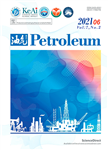Alcohols for hydrate inhibition-Different alcohols and different mechanisms
作者机构:State Key Laboratory of Oil and Gas Reservoir Geology and ExploitationSouthwest Petroleum UniversityChengdu610500China State Key Laboratory of Natural Gas HydrateBeijing10027China HyzenenergyLaguna Hills92656USA Strategic Carbon LLCPortsmouth03801USA
出 版 物:《Petroleum》 (油气(英文))
年 卷 期:2022年第8卷第1期
页 面:1-16页
核心收录:
学科分类:07[理学] 0817[工学-化学工程与技术] 0818[工学-地质资源与地质工程] 0815[工学-水利工程] 070303[理学-有机化学] 0703[理学-化学]
基 金:The authors are grateful for financial support through 111 Project(No:D21025) National Key Research and Development Program(No:2019YFC0312300) National Natural Science Foundation Item of China(No:U20B6005-05,51874252 and 5177041544) Open Fund Project of State Key Laboratory of Oil and Gas Reservoir Geology and Exploitation(No:PLN2021-02 and PLN2021-03).
主 题:Hydrate Non-equilibrium Thermodynamics Alcohols Nucleation
摘 要:Methanol has been used to prevent hydrate formation in industrial handling of hydrate forming mixtures containing water for many decades.Ethanol is also used for the same purpose in countries that have easy access to low price ethanol,like for instance Brasil.Common to these small alcohols is that they also have surfactant properties that will promote hydrate formation,but when added to water in sufficient amounts,the hydrate prevention characteristics will dominate.These alcohols will primarily prevent heterogeneous hydrate formation on the interface between water and a separate hydrate phase.The effect of“alcoholon both of these routes to hydrate formation are investigated and compared to experimental data.In particular we also investigate the effects of these small alcohols on Gibbs free energy for the hydrate formed on the new,shifted,stability conditions.Gibbs free energy is generally higher than hydrate formed from pure water.Enthalpies of hydrate formation are also higher for hydrate formed from water containing alcohols.These are negative numbers,so in absolute values released formation enthalpy is lower.The presence of these alcohols in water will also prevent homogeneous hydrate formation from dissolved hydrate formers in water.Glycols have more important roles in other routes to hydrate nucleation.Heterogeneous hydrate nucleation towards mineral surfaces is feasible in different ways.Polar hydrate formers like H2S and CO_(2)can adsorb directly on rust,and as discussed here,are able to form hydrate from adsorbed state on rust surface.Non-polar hydrocarbons like,for instance methane might get trapped in structured water and then nucleate to hydrate.Some research on this is published and further research is in progress.Glycols have very strong attraction to rust and corresponding chemical potentials for adsorbed glycols on rust are favourable enough to facilitate phase transition from glycols dissolved in water over to adsorption.Injection of glycol in gas processing plants has been used by industry for many years and in many cases it might even be economically and technically feasible compared to expensive drying units.Exceptions are situations that will lead to water/glycol freezing.But even in multiphase transport of hydrocarbons with various water cuts,mixtures of alcohols might be a technically efficient solution in which the small alcohols may be very efficient as discussed above and glycols may go through adsorption phase transition from water solution over to glycol film on rust and prevent hydrate nucleation towards rust surface.This possible strategy requires more theoretical work as well as experimental investigation.On the basis of thermodynamic analysis and calculations of hydrate formation from different routes,it is argued that real natural and industrial systems are unable to reach thermodynamic equilibrium.It is therefore a need for a consistent thermodynamic platform with a uniform reference system for all phases.We propose and demonstrate a residual thermodynamic model system for all phases.



